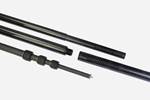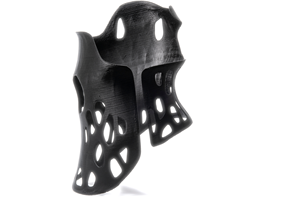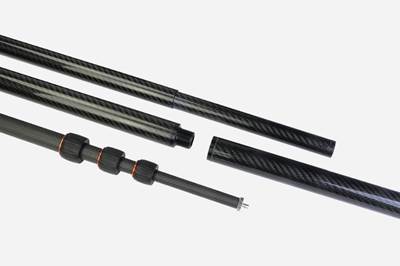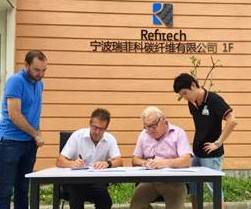
The IO carbon fiber white cane, developed by Whitecane and produced in cooperation with Refitech and CG Tec, is extremely lightweight, making the cane easy to handle, reducing fatigue and the risk of injury, while improving sensory perception. Photo Credit: Whitecane
Whitecane (Duderstadt, Germany) is a company with a goal of designing and developing high-quality, technically sophisticated medical products, with a focus on equipment to aid the visually impaired. Supported by composite engineering and production specialist Refitech Composite Components (Waalwijk, Netherlands) and partner CG Tec GmbH (Spalt, Germany), Whitecane has developed and launched IO, an innovative white cane featuring a lightweight, easy-to-handle composite tube structure and ergonomic, carbon fiber grip.
The partnership, according to Bas Nijpels, sales engineer at Refitech, began in 2018. “The cooperation came about when we purchased carbon tubes for our first prototypes from the CG Tec web shop,” adds Lüder Mosler of Whitecane. When Whitecane began to look for a partner to design a carbon grip for the cane, CG Tec, which had formed a strategic partnership with Refitech in 2018, recommended Refitech. “Both companies have shown a great willingness to respond to our very specific technical and economic requirements, and find good solutions together,” Mosler says. “This has resulted in a highly innovative carbon fiber white cane that has no match in the current market.”
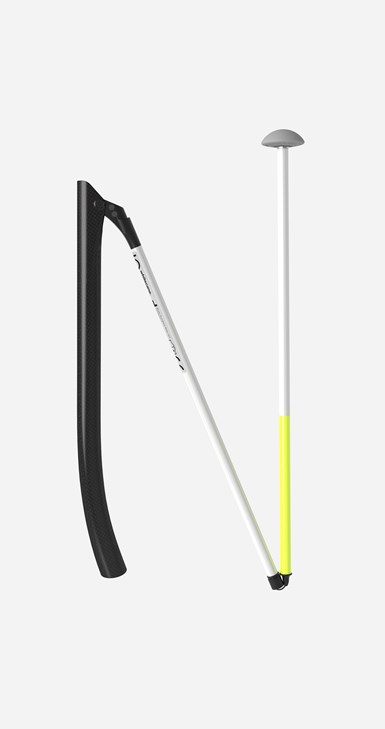 The ergonomics of the IO white cane are enhanced by a curved handle that follows the natural hand position, while the cane can be easily folded and unfolded even in tight spaces. Photo Credit: Whitecane
The ergonomics of the IO white cane are enhanced by a curved handle that follows the natural hand position, while the cane can be easily folded and unfolded even in tight spaces. Photo Credit: WhitecaneCG Tec supplies the carbon fiber/epoxy prepreg tubes, which are manufactured in a semi-automatic process of winding prepreg around mandrels, and assembles the canes in batches at its Spalt facility. “In a first conversation, the idea and the background of the IO white cane were introduced, and this immediately triggered our enthusiasm,” says Oliver Kipf, CEO of CG Tec. “Based on Whitecane’s requirements, we first developed carbon fiber tubes that could withstand the expected pressure loads in combination with a high bending stiffness. The tight tolerances were a challenge, but we solved that in the end.” The much greater stiffness compared to a standard cane, Nijpels explains, enables a sturdier contact and better experience and feel for the user.
In addition to stiffness, Nijpels says, two of Whitecane’s top requirements for the design were ease of assembly and affordability for the consumer. “Our engineers worked closely with Whitecane and CG Tec on the design, giving advice and having regular meetings to discuss the project progress,” Nijpels says.

For the carbon fiber grips, Refitech needed to develop a “mirrored” design, Nijpels says, that could be manufactured for both right- and left-handed users. For this project, the company used its experience designing similar products for medical and consumer applications, such as a carbon fiber guide dog handle that was a finalist for a JEC 2019 Innovation Award. The white cane grip is manufactured from a twill-weave carbon fiber/epoxy prepreg over top of an additional layer of unidirectional (UD) fabric. The parts are manufactured via a blow molding process followed by autoclave cure. “This allows for a lightweight, thin-walled part, allowing us to manufacture in series production at a reasonable cost,” Nijpels says.
The grip is connected to the rest of the cane via a specially designed bracket. The design also features a lightweight rolling tip and a patented yield mechanism that immediately folds the cane upon impact with an obstacle, reducing the risk of injury due to a collision. IO can also fold into three segments for easy transport and storage.
“This application clearly demonstrates the potential benefits that 3D-formed carbon components can bring: an integral solution designed and produced with innovative materials, ensuring an immediate competitive edge over the competition,” Nijpels says.
Whitecane launched IO to the German medical market in early 2020. Next steps include expanding certifications for the product in other countries and expanding IO’s distribution network with additional partners. Over the next few years, Whitecane also plans to scale up production of the product, from current batches of 100 parts per shipment to up to 700 per batch.
Related Content
Composite innovations feature automotive, water sports, UAV and consumer project versatility
JEC World 2025: Precision, performance and reliability are at the core of Cobra International’s display, involving a front end, portfolio of water sports applications, a fixed wing drone and more.
Read MoreGenerative Orthoses project to reshape orthopedic care
CRP Technology, MHOX and Istituto Ortopedico Rizzoli, one of the winners of the WORTH Partnership Project II, have developed bespoke orthoses using generative design, Windform GT fiberglass materials and PBF.
Read MoreMulti-material, self-sensing, 3D-printed scoliosis braces
Startup Fited and Brightlands Materials Center have developed a lighter weight, thinner CFRP corrective brace, including pressure sensors made from continuous carbon fibers.
Read MoreComposites housing improves organ transport to save lives
Vabo Composites collaborates on novel design, supplies lighter, higher volume production housing.
Read MoreRead Next
Refitech launches carbon fiber composite telescopic tube
The lightweight RefiFLEX TS pole22 is said to be ideal for carrying audiovisual equipment and applications in the hospitality and medical industries.
Read MoreCG TEC and Refitech partner on composite components
CG TEC has signed a strategic partnership agreement with Refitech.
Read MoreAll-recycled, needle-punched nonwoven CFRP slashes carbon footprint of Formula 2 seat
Dallara and Tenowo collaborate to produce a race-ready Formula 2 seat using recycled carbon fiber, reducing CO2 emissions by 97.5% compared to virgin materials.
Read More

.jpg;width=70;height=70;mode=crop)
